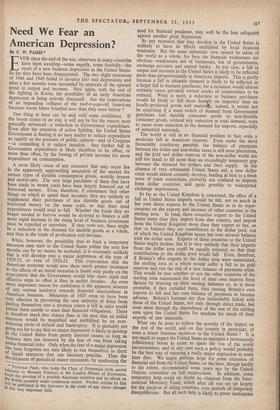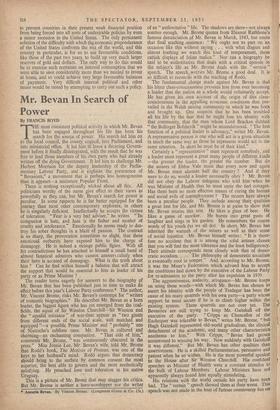Need We Fear an American Depression?
By F. W. PALSH* EVER since the end of the war, observers in many countries have been awaiting—some eagerly, some fearfully—the onset of a new business depression in the United States. So far they have been disappointed. The two slight recessions of 1946 and 1949 failed to develop into real depressions and after a few months were succeeded by renewals of the upward trend in output and incomes. Now again, with the end of the fighting in Korea, the possibility of an early American depression is being actively discussed. Are the expectations of an impending collapse of the twelve-year-old American business boom better founded now than they were before ?
One thing at least can be said with some confidence. If the boom comes to an end, it will not be for the reason most generally advanced—a reduction in Government expenditure. Even after the cessation of active fighting, the United States Government is finding it no easy matter to reduce expenditure as rapidly as the pressure of public opinion—and of Congress —is compelling it to reduce taxation. Any further fall in Government expenditure is likely therefore to be offset, or more than offset, by the freeing of private incomes for more expenditure on consumption.
A more likely cause of any recession that may occur lies in the apparently approaching saturation of the market for certain types of durable consumption goods, notably houses and motor-cars. The very large purchases of these that have been made in recent years have been largely financed out of borrowed money. Even, therefore, if consumers find other things on which to spend their incomes, they are unlikely to supplement their purchases of less durable goods out of borrowed money on the same scale, so that their total expenditures would tend to fall. Whether the funds they no longer needed to borrow would be diverted to finance a still more rapid increase in the rising level of business investment must be regarded as uncertain. If they were not, there might be a reduction in the demand for durable goods as a whole, and thus in the totals of production and incomes.
While, however, the possibility that at least a temporary recession may start in the United States within the next few months can by no means be excluded, it is extremely unlikely that it will develop into a major depression of the type of 1929-33, or even of 1920-21. This expectation that the American economy would now show much greater resistance to the effects of an initial recession is based only partly on the expectation that the Government would take more rapid and effective steps to offset it than in earlier decades. An even more important reason for confidence is the apparent absence of any serious tendency towards financial unsoundness in American business. Memories of 1929 seem to have been very effective in preventing the vast majority of firms from putting themselves into a position where a fall in sales would render them unable to meet their financial obligations. Thera is therefore much less chance than in the past that an initial recession would be magnified and multiplied by an ever- Widening circle of default and bankruptcy. It is probably not going too far to say that no major depression is likely to develop in the United States from purely internal causes so long as business men are deterred by the fear of one from taking undue financial risks. Only when the fear of a major depression has been forgotten are men likely to run themselves so short of liquid resources that one becomes possible. Thus the development of periodical minor recessions, by reinforcing the * Professor Paish, who holds the Chair of Economics (with special ,reference to Business Finance) at the London School of Economics, keeps the question of a possible American recession and its effects on the British economy under continuous review. Further articles by him will be published in the Spectator in the event of any major changes In this very important field. need for financial prudence, may well be the best safeguard against another great depression.
So any recession that may develop in the United States is unlikely to have its effects multiplied by local financial weakness. But the same optimistic view cannot be taken of the world as a whole, for here the financial weaknesses are obvious—weaknesses not of businesses, but of governments, exchange accounts and central banks. In any case, a fall in output and incomes in the United States is likely to be reflected more than proportionately in American imports. This is partly because a fall in ultimate demand is likely to be reflected in a larger fall in business purchases; for a recession would almost certainly cause privately owned stocks of commodities to be reduced. What is more, a reduction in business purchases would be likely to fall more hea ly on imported than on locally-produced goods and materitfis; indeed, it would not be surprising if a mere switch of demand from Government purchases and durable consumer goods to non-durable consumer goods, without any reduction in total demand, were to cause some reduction in the demand for imports, especially of industrial materials.
The world is still in no financial position to face even a moderate fall in American imports. Even under the most favourable conditions possible, the balance of payments between the dollar and non-dollar areas is still most precarious, and the gold and dollar reserves of the non-dollar world are still too small to fill more than an exceedingly temporary gap between the demand for dollars and their supply. In the absence of very substantial United States aid, a new dollar crisis would almost certainly develop, leading at best to a fresh wave of trade restrictions, probably not confined to imports from dollar countries, and quite possibly to widespread exchange depreciation.
So far as the United Kingdom is concerned, the effect of a fall in United States imports would be felt, not so much in her own direct exports to the United States as in its reper- cussions on the exports and incomes of other countries in the sterling area. In total, these countries export to the United States more than they import from that country, and import from the United Kingdom more than they export to her, so that on balance they are contributors to the dollar pool, out of which the United Kingdom meets her own adverse balance with the dollar area. Exports of these countries to the United States might decline, but it is very unlikely that their imports from the dollar area could be equally reduced; so that their contributions to the dollar pool would fall. Even, therefore, if Britain's dm exports to the dollar area were maintained, the sterling area as a whole would suffer a fall in its gold reserves and run the risk of a new balance of payments crisis. This would be true whether or not the other countries of the sterling area maintained the level of their own imports from Britain by drawing on their sterling balances or, as is more probable, if they curtailed them, thtis causing Britain's own exports to fall and her own balance of payments to become adverse. Britain's fortunes are thus indissolubly linked with those of the United States, not only through direct trade, but even more through the dependence of the rest of the sterling area upon the United States for markets for much of their exports of raw materials. What can be done to reduce the severity of the impact on the rest of the world, and on this country in particular, of even a minor business recession in the United States ? It is too much to expect the United States to maintain a permanently inflationary boom in order to spare the rest of the world inconvenience; and in any case such a policy would probably be the best way of ensuring a really major depression at some later date. We might perhaps hope for some extension of financial aid from the United States, on the lines, though hardly to the extent, recommended some years ago by the United Nations committee on full employment. In addition, some temporary help could no doubt be obtained from the Inter- national Monetary Fund, which after all was set up largely for the purpose of tiding countries over periods of temporary disequilibrium. But all such help is likely to prove inadequate to prevent countries in their present weak financial position from being forced into all sorts of undesirable policies by even a minor recession in the United States. The only permanent .solution of the difficulty with which thg economic preponderance of the United States confronts the rest of the world, and this country in particular, is for us to use favourable conditions, like those of the past two years, to build up very much larger reserves of gold and dollars. The only way to do this would be to exercise such restraints on internal consumption that we were able to save considerably more than we needed to invest at home, and so could achieve very large favourable balances of payments. Very difficult internal political and other issues would be raised by attempting to carry out such a policy.



































 Previous page
Previous page